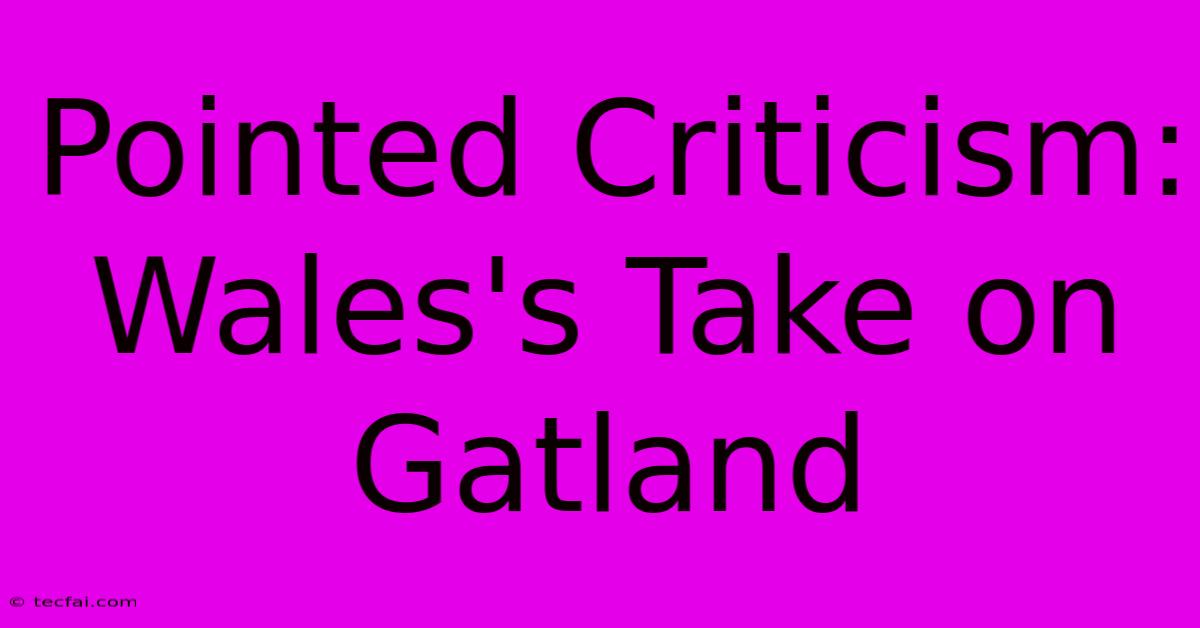Pointed Criticism: Wales's Take On Gatland

Discover more detailed and exciting information on our website. Click the link below to start your adventure: Visit Best Website tecfai.com. Don't miss out!
Table of Contents
Pointed Criticism: Wales's Take on Gatland
Warren Gatland's return as Wales head coach has been met with a mixed reception, to say the least. While some see his appointment as a necessary injection of experience and winning pedigree, others have voiced pointed criticism, highlighting concerns about his coaching style and its potential impact on Welsh rugby. This article delves into the nuanced perspectives surrounding Gatland's reappointment, exploring both the praise and the considerable backlash.
The Gatland Legacy: A Double-Edged Sword
Gatland's previous tenure (2007-2019) undeniably yielded success. He led Wales to four Six Nations titles, including a Grand Slam in 2012, and consistently delivered strong performances in the Rugby World Cup. This impressive track record is a significant factor in his continued appeal. His ability to build a winning team, often from seemingly limited resources, is legendary among Welsh rugby fans. However, this legacy is not without its shadows.
Concerns About Playing Style
A frequent criticism leveled against Gatland is his emphasis on a pragmatic, often conservative style of play. This approach, while effective in achieving wins, has been accused of stifling creativity and failing to develop exciting, attacking rugby. Many believe this approach doesn't nurture young talent and hinders the long-term development of Welsh rugby. This criticism is particularly relevant given Wales's current struggle to produce consistently world-class players. Is a win-at-all-costs mentality truly sustainable for the future of Welsh rugby? This is a question many are asking.
The Player Exodus and Contract Disputes
The ongoing contractual disputes between the Welsh Rugby Union (WRU) and its players have cast a long shadow over Gatland's return. The highly publicized battle over player contracts, leading to a significant player exodus, has fuelled concerns about the wider issues within Welsh rugby and the environment Gatland is inheriting. Gatland's ability to navigate these complex issues and rebuild team morale will be crucial to his success. Can he unite a fractured squad and restore the national team’s unity?
A Necessary Evil or a Step Backwards?
Some argue that despite these concerns, Gatland's appointment was a necessary step to ensure Wales's competitiveness on the international stage. His experience and ability to deliver results in high-pressure situations are undeniably valuable assets. The immediate priority, they suggest, is to restore winning ways and secure qualification for the next Rugby World Cup. This pragmatic approach, however, is at odds with those who advocate for a more forward-looking strategy focused on developing a long-term sustainable plan, prioritizing player development and a more attacking style of play.
The Need for a Broader Vision
The controversy surrounding Gatland's appointment highlights the need for a broader vision for Welsh rugby. The WRU must address the underlying issues that contributed to the player exodus and ensure a more sustainable future for the sport in Wales. Gatland's success will ultimately depend not only on his coaching abilities but also on the wider support and strategic planning from the WRU. Simply relying on a proven coach to solve systemic problems is a risky approach.
Conclusion: A Critical Juncture for Welsh Rugby
Gatland's return to Welsh rugby marks a critical juncture. While his past successes are undeniable, the pointed criticism surrounding his appointment reflects deep-seated concerns about the future of the sport in Wales. His ability to address these concerns, foster a positive team environment, and deliver on the field success will determine whether his reappointment is ultimately judged a success or a setback for Welsh rugby. The upcoming Six Nations Championship and Rugby World Cup will provide important benchmarks in evaluating his impact. The long-term consequences, however, may take years to fully assess.

Thank you for visiting our website wich cover about Pointed Criticism: Wales's Take On Gatland. We hope the information provided has been useful to you. Feel free to contact us if you have any questions or need further assistance. See you next time and dont miss to bookmark.
Featured Posts
-
New Baby For Irelands Social Democrat Leader
Nov 30, 2024
-
Maintenance Issue Forces Tui Flight Abort
Nov 30, 2024
-
Leadbeaters Assisted Dying Bill Next Steps
Nov 30, 2024
-
Ps 5 Pro Black Friday Speletjies
Nov 30, 2024
-
Tui Flight Abort Missed Error Message
Nov 30, 2024
